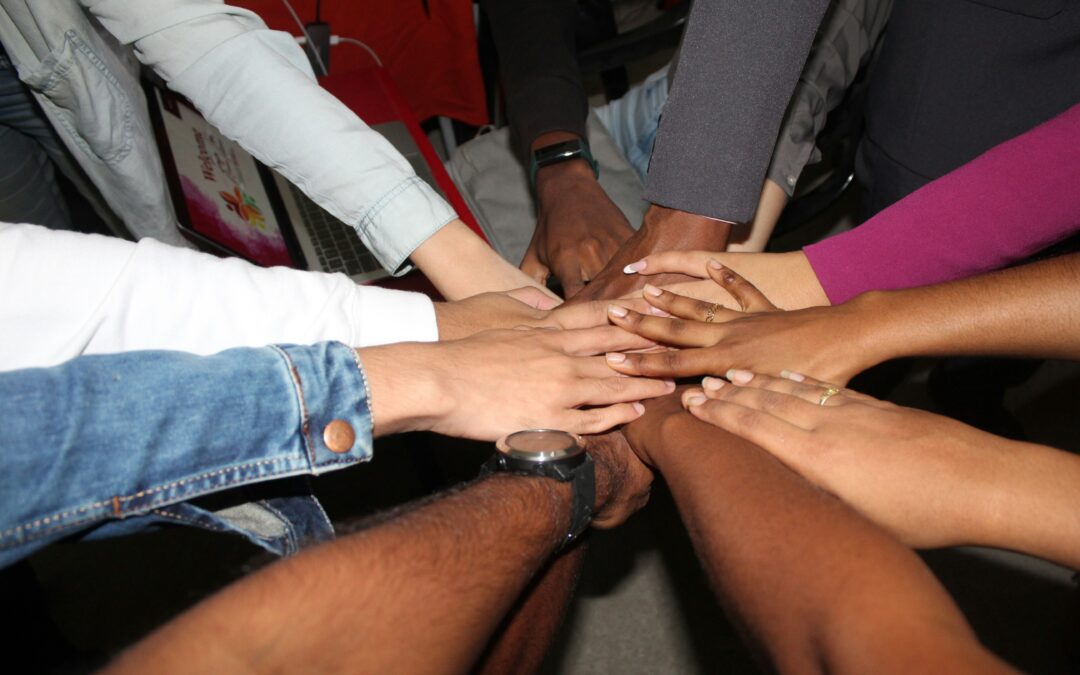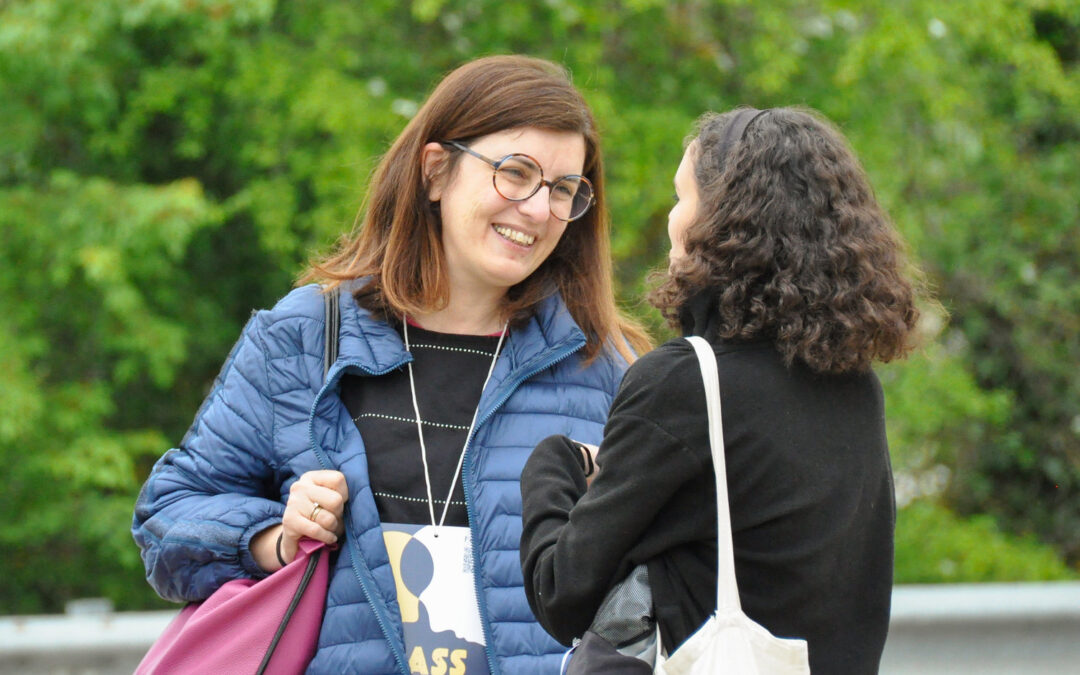
1 Jul 2025 | Idea of the Month
Every day we see a great deal of suffering all around us and this can make us feel
overwhelmed and helpless if we do not draw upon deep human values. Sometimes, however,
the answer arrives on WhatsApp. This is whath appened to a community that tries to build
unity in a small town in Italy: “…In the hospital where I work there is a young man, a foreigner,
who is completely alone and dying. Maybe someone could spend a few minutes with him, to bring
some dignity to this situation?” This request was a shock: the responses followed quickly. The
messages from those who were with the man in his last few hours said, “At his bedside we
immediately saw that he was receiving care at the right time and that it was attentive and loving.
Really there was nothing for us to to do except be there: he was in a coma and could not benefit
from our presence.”
Was staying at the man’s bedside unnecessary and a waste of time? In those few
hours a small community, inside and outside the hospital, accompanied and brought
meaning to that situation. Who knows if a mother will be able to mourn that son in his own
country. Surely his “passing” was not in vain for those who could love that young man who
was no longer unknown. Compassion is a feeling that comes from within, from the depths
of the human heart. It makes us capable of interrupting our busy daily routine of schedules
and appointments and take the initiative to approach others and gaze at them with care,
unafraid to “touch” their wounds.
Chiara Lubich explains it with striking simplicity: “Let us imagine that we are in their
situation and treat them as we would like to be treated in their place. Are they hungry? We think – I
am hungry too. And let’s feed them. Is that person experiencing injustice? I am suffering injustice
too! And let us offer words of comfort and share their sorrows: let’s persevere until they feel
enlightened and uplifted. We will slowly see the world around us change.“ 1.
African wisdom also confirms this in a proverb from the Ivory Coast: “The person who
welcomes a stranger hosts a messenger.”
This Idea offers us a method of living out true humanism: it makes us aware of our
common humanity in which the dignity inherent in every man and woman is reflected. It
also teaches us to courageously go beyond the understanding that “closeness” is
determined by physical and cultural contexts. Thinking in this way, it is possible to expand
the boundaries of “us” to the horizon of “all” and rediscover the very foundations of social
life. When we feel we are succumbing to the impact of the suffering all around us, it is
important to draw upon the help of friends who share our views and accompany us through
life and so allow ourselves to be healed. Let’s remember, as psychiatrist-psychotherapist
Roberto Almada says, “If the good people give up the battle because of fatigue, our common
humanity will run the greatest of risks: value impoverishment.”2.
1. Chiara Lubich, The Art of Loving
2. R. Almada, Il burnout del buon samaritano, Effatà editrice, 2016
Photo: © Alexandra_Koch en Pixabay
THE IDEA OF THE MONTH is currently produced by the Focolare Movement’s “Centre for Dialogue with People of Non religious Beliefs”. It is an initiative that began in 2014 in Uruguay to share with non-believing friends the values of the Word of Life, i.e. the phrase from Scripture that members of the Movement strive to put into practice in their daily lives. Currently, THE IDEA OF THE MONTH is translated into 12 languages and distributed in more than 25 countries, with adaptations of the text according to different cultural sensitivities. dialogue4unity.focolare.org

1 Jun 2025 | Idea of the Month
Every day terrible things are happening all around us and sometimes they are on such a scale that they overwhelm us and make us feel helpless: migrants are losing their lives as they undertake journeys in desperate conditions, people are experiencing the daily tragedy of war and dramatic social injustices continue to plague the planet.
“What can I do?” This question may leave us feeling paralyzed and tempt us to close in on ourselves in an attitude of resigned individualism. The first hurdle to overcome is to allow ourselves to be cross-examined by that very question. “What can I do?”
The fishermen on the shores of Lampedusa in Italy asked themselves this and then connected with generous people in the area forming a network that was able to reach out to others. They began by saving one, then ten, then a hundred and then thousands of desperate castaways who were abandoned to the waves of the Mediterranean Sea. There are also communities living in areas that border on war zones (in Europe, Africa, Asia…) who have asked themselves the same question. They welcomed people into their homes not on the basis of political or economic calculation, but because of natural human compassion. It’s in situations like this that you can see small or large daily “miracles” which are not utopian dreams but are the actions upon which the society of the future is built.
Professor Russell Pearce [1] of Fordham School of Law in New York emphasised that it is important to seek for hope and not wait for it to come to us. He conducted interviews with people from two organizations that promote dialogue and peace between Israelis and Palestinians – Parents Circle and Combatants for Peace – and sought to understand how their members managed to maintain relationships with each other in the aftermath of 7 October 2023 and during the subsequent war in Gaza.
Why have these groups sustained their ties with one another? Why have these ties even become stronger? Both Palestinians and Israelis reported that their dialogue has been transformative and described it as a dialogue of love. A Palestinian participant observed, “The change we experienced was a very “sacred journey” for each of us and left an impact and a deep bond in our souls. It was a process that transformed the other person into a brother or sister.”
An Israeli member also commented, “We worked to build trust and become a family, years of sacred work with all the challenges, dynamics and doubts.” Pearce concluded by saying that the Jewish sages teach that “if you save one life, you save the whole world”; a Palestinian who leads the Parents Circle youth programme explained, “If you change one person, you change a whole world.”
Chiara Lubich wrote, “The most visible aspect of unity is fraternity. This certainly seems the best way to counteract the prevailing norms of society (…) to reach greater freedom and equality. (…) It is a sound way for those who hold the fate of humanity in their hands but also for mothers of families, for volunteers who work for solidarity in the world, for those who share their company’s profits to help eliminate poverty and for those who oppose war. Thus, fraternity “from above” and fraternity “from below” will meet in peace.” [2]
——————————–
THE IDEA OF THE MONTH is currently produced by the Focolare Movement’s “Centre for Dialogue with People of Non religious Beliefs”. It is an initiative that began in 2014 in Uruguay to share with non-believing friends the values of the Word of Life, i.e. the phrase from Scripture that members of the Movement strive to put into practice in their daily lives. Currently, THE IDEA OF THE MONTH is translated into 12 languages and distributed in more than 25 countries, with adaptations of the text according to different cultural sensitivities. dialogue4unity.focolare.org
[1] R. Pearce: “Dialogo e Pace sostenibili” [Ekklesia-Sentieri di Comunione e Dialogo- n.4 Octtober December 2024].
[2] C. Lubich, No alla sconfitta della pace, in «Città Nuova» n. 24/2003
©Photo: Rineshkumar Ghirao – Unsplash

1 May 2025 | Idea of the Month
Often life presents us with situations which lead us to slowly and unintentionally close in on ourselves: this may be the result of an disagreement or because of our views or ego or even due toour fears.
But sometimes it is enough to stop and just ask ourselves a simple question, made up of simple words, and, unexpectedly, we become aware that change is possible. The questionis: “Who are you to me?” or, in other words, “Who am I to you?” Questions that, as Margaret Karram says, pave the way to taking concrete action: “take the first step, listen, spare no time, let yourself be ‘wounded’ by others.”[1] It is obvious: if we think about others, we do not think of ourselves, nor of our weaknesses, failures or emotional scars that others have inflicted. Thinking about the other person helps us put ourselves in their shoes, in an attitude of reciprocity: “how would I feel if the other person told me what I am telling him or her?” or “what can I do for him or her?”
lf our actions stem from a desire to put the well-being of those around us first, everything can acquire a greater dimension, to the point where we can tell the other person that we love them gratuitously and without expecting anything in return.
However, sometimes we are overwhelmed by discouragement, frustration, and tiredness. The American doctor, Ira Robert Byock, says that the times of greatest despair arise when we feel imprisoned in “a well of fear, anger and distrust”. [2] In those moments, let us surrender to the power of love that can do anything, can free us from all that holds us back and encourages us to begin again without fear. The music group “Gen Rosso” expresses this idea in one of its songs by saying, “Starting anew is like saying yes to life again, and then breaking free and flying to boundless horizons, where thoughtsare free from fear. Your home becomes as big as the world. To begin again is to believe in love and to feel that even in times of pain, the soul can sing and never stop.”
Such an attitude can bring about personal change, but can also make an impact upon the community when we share our difficulties with other people in sincere and constructive dialogue. An atmosphere of true friendship rebuilds relationships in the community enabling anger to be replaced by reflection, fear by the discovery of new pathways and distrust by hope. We will then become a sign of a different way of creating society.
Sometimes simple words really are enough:
“You matter to me…because you are you!”
Photo: © Pixabay
[1] M. Karram: “Prossimità” – 2024
[2] in: The Economist – The 2015 Quality of Death Index. Ranking palliative care acrosstheworld
THE IDEA OF THE MONTH is currently produced by the Focolare Movement’s “Centre for Dialogue with People of Non religious Beliefs”. It is an initiative that began in 2014 in Uruguay to share with non-believing friends the values of the Word of Life, i.e. the phrase from Scripture that members of the Movement strive to put into practice in their daily lives. Currently, THE IDEA OF THE MONTH is translated into 12 languages and distributed in more than 25 countries, with adaptations of the text according to different cultural sensitivities. dialogue4unity.focolare.org

1 Apr 2025 | Idea of the Month
Nostalgia is a very specific feeling and, in many people, it often gives riseto moral, philosophical and spiritual questions. Etymologically it means “pain of return,” and sometimes has an indeterminate sense: sometimes it is not linked to a past made up of real places, people or events but to a deep emotion that makes us yearn for something beautiful, just and universal. It is as if we know we are part of it or called to this “something”.
The theme of exile runs through the history of human thought: the voyage of Odysseus (sung in Homer’s Odyssey) is a journey that recalls the infinite because although it is unfinished and open-ended, it also conveys a sense of wisdom.
(…)
“Keep Ithaca always in your mind. Arriving there is what you are destined for. But do not hurry the journey at all. Better if it lasts for years. (…) And if you find her poor, Ithaka won’t have fooled you. Wise as you will have become, so full of experience, you will have understood by then what these Ithakas mean.”[1]
Every story of exile, whether it is taken from ancient civilizations or the present day, addresses existential questions that are fundamental to all ages: does this story have meaning? Is there a “thread” behind it all? This question can also be addressed on a personal level: is there meaning to what I am experiencing or have experienced? Why the evil, the pain, the death? These are questions that are often not asked but, according to recent studies, they are deeply felt by young people and express their real needs. Nostalgia for the infinite is often manifested in melancholy, loneliness and a search for reasons and answers. [2]
Yet these questions struggle to emerge: we are distracted by what is happening around and by the worries that torment us. Perhaps we do not pause long enough to recognise the little answers that surround us that can be a light to help us maintain a sense of purpose in life.
So let us try to look for opportunities where we can find time and space for sharing, listening and reflecting with those who travel through life with us. Let’s do so with our community, our friends and work colleagues. Let’s tackle these questions without losing faith that things can change for the better. We too will feel changed as a result.
In Christian communities all over the world, Easter is celebrated this month. The message that lies behind the “three days” that are central to this season is strong: it poses questions for all people who are ready to reflect and are open to dialogue[3]. The mystery of pain, the ability to “enter” into the wounds of humanity and the strength to begin again are the values shared by every person who accompanies us as we journey forward through difficult times.iii They are a personal guide for us at all times.
© Photo da StockSnap/Pixabay
——————————–
THE IDEA OF THE MONTH is currently produced by the Focolare Movement’s “Centre for Dialogue with People of Non religious Beliefs”. It is an initiative that began in 2014 in Uruguay to share with non-believing friends the values of the Word of Life, i.e. the phrase from Scripture that members of the Movement strive to put into practice in their daily lives. Currently, THE IDEA OF THE MONTH is translated into 12 languages and distributed in more than 25 countries, with adaptations of the text according to different cultural sensitivities.
[1]Konstandinos P. Kavafis. Poesie, Mondadori, Milano 1961
[2]Istituto Giuseppe Toniolo: Cerco, dunque credo? (Vita e Pensiero, 2024) cura di R. Bichi e P. Bignardi
[3]Convegno Internazionale “Il senso nel dolore?” (Castel Gandolfo, 2017) https://www.cittanuova.it/senso-neldolore/?ms=006&se=007

1 Mar 2025 | Idea of the Month, Testimonianze di Vita
It seems obvious that we are made to relate to other people: in fact, we could even say that our lives are intertwined by the relationships we make. However, we sometimes we risk spoiling the latter with our harsh or superficial judgements.
Throughout history, various images have become part of everyday language. Thus, in
ancient tradition we find a well-known expression that says: ‘Why do you look at the speck in your brother’s eye and not notice the plank in your own?’[1] Equally proverbial is the image of the two saddlebags: one in front of our eyes, filled with the faults of other people which we easily see, and the other on our backs, holding our own faults which we then struggle to recognise.[2] There is also a Chinese proverb that says, ‘Man is blind to his own faults but has eagle eyes for those of others.’
This does not mean that we should indiscriminately accept what other people do and just let events run their course. Faced with injustice, violence or oppression, we cannot close our eyes. We must commit ourselves to change and start by looking at ourselves and listening sincerely to our own consciences to discover what we need to improve. Only then can we ask ourselves how we can concretely help others by sometimes offering advice and correction.
Each one of us needs ‘another point of view’ that offers a perspective different from our
own, enriching our ‘truth’ and helping us to avoid self-referentiality and those errors of judgement that are part of our human nature.
The word “mercy” may seem old fashioned but it is rich with meaning relevant to today: we can be merciful first towards ourselves and then towards others too. In fact, only if we are able to accept and forgive our own limitations will we be able to welcome the weaknesses and mistakes of others. Indeed, when we realise that unconsciously we may be feeling superior and in a position to judge other people, it is vital that we are willing to take ‘the first step’ towards the other person to avoid damaging the relationship.
Chiara Lubich told a group of Muslims about her experience when she and her companions lived in a small house in Trent as they began their adventures at the start of the Movement. Not everything was simple and there were misunderstandings. “It was not always easy to love in aradical way […] “Dust” could settle on our relationships and unity could diminish. This happened, for example, when we became aware of the faults and imperfections of others and judged them, so our mutual love grew cold. One day, we decided we should try to counter this situation and we decided
to make a pact among ourselves and called it a ‘pact of mercy’. We decided that every morning we would see the people we met – at home, at school, at work, etc. – as new without calling to mind their faults but covering everything with love.” [3] his is a ‘method’ worth putting into practice in groups at work, in the family and in
communities of all kinds.
© Foto di Cottonbro studio – Pexels
THE IDEA OF THE MONTH is currently produced by the Focolare Movement’s “Centre for Dialogue with People of Non-religious Beliefs”. It is an initiative that began in 2014 in Uruguay to share with non-believing friends the values of the Word of Life, i.e. the phrase from Scripture that members of the Movement strive to put into practice in their daily lives. Currently, THE IDEA OF THE MONTH is translated into 12 languages and distributed in more than 25 countries, with adaptations of the text according to different cultural sensitivities. dialogue4unity.focolare.org
[1] (Lc 6,41)
[2] Esopo (μῦθοι) , Fedro (Fabulae)
[3] C. Lubich, L’amore al prossimo, Conversazione con gli amici musulmani, Castel Gandolfo, 1° novembre 2002. Cf. C. Lubich, L’Amore reciproco, Città Nuova, Roma 2013, pp. 89-90.

1 Feb 2025 | Idea of the Month
Sometimes we are faced with situations where it is difficult to make a judgment or take a clear position. Wetry to understand the deeper meaning of whatever we are facing and comprehendits significance andvaried perspectives.
We need a light to guide us. Just as underground miners move forward one meter at a time with the help of a simple lantern, we too have a light that can illuminate our steps, one by one. We know what this is: love for each other is a powerful light that guides us and helps with the difficult task of informing our personal consciences as we journey through life.
We need to be able to be aware of the complexity of views and opinions held by people around us or those we meet sometimes by chance. It is important to always maintain a sense of honesty and to be aware of the limitation of our own point of view. Openness of mind and heart, the fruit of true love, creates a capacity for a dialogue that listens, that looks for the good in the other person and is open to the possibility of creating something together.
Timothy Radcliffe, one of the theologians present at the last Synod of Bishops of the Catholic Church, referred to this personal need we may experience. He told members of the Synod that: ” The bravest thing we can do is to be honest with each other about our doubts and questions, those for which we have no clear answers. Then we will approach each other as fellow seekers, beggars of truth (1)”.
In a conversation with members of the Focolare, Margaret Karram commented on this reflection: ‘Thinking about it, I realised that many times I did not have the courage to really say what I thought: perhaps because I was afraid of not being understood or because I didn’t want to be different from the majority. I realised that being “beggars of truth” means having that attitude of closeness towards one another, in which we seek the good of the other.”(2).
This is Antía’s, experience. She is a member of “Mosaico”, a performing arts group that began in Spain in 2017. It is composed of young Spaniards from different backgrounds and cultures who use their art and workshops to offer their experience of fraternity to others. Antia tells us: ‘It connects with my values – a fraternal world, in which everyone (very young, inexperienced, vulnerable…) gives their contribution to the project. “Mosaico” makes me believe that a more united world is not a utopia, despite the difficulties and hard work involved. I grew up working in a team where dialogue was too honest at times and I often gave up on my own ideas which I believed to be the best. I see that in this project “good” is built piece by piece together, by us all ” (3).
1. Timothy Radcliffe, Meditation to Synod of Bishops, 2.10.2023
2. Margaret Karram, President of Focolare Movement, 3.02.2024
3. Mosaic GRLP
Foto: © Comunicazione Loppiano
THE IDEA OF THE MONTH is currently produced by the Focolare Movement’s “Centre for Dialogue with People of Non religious Beliefs“. It is an initiative that began in 2014 in Uruguay to share with non-believing friends the values of the Word of Life, i.e. the phrase from Scripture that members of the Movement strive to put into practice in their daily lives. Currently, THE IDEA OF THE MONTH is translated into 12 languages and distributed in more than 25 countries, with adaptations of the text according to different cultural sensitivities.






